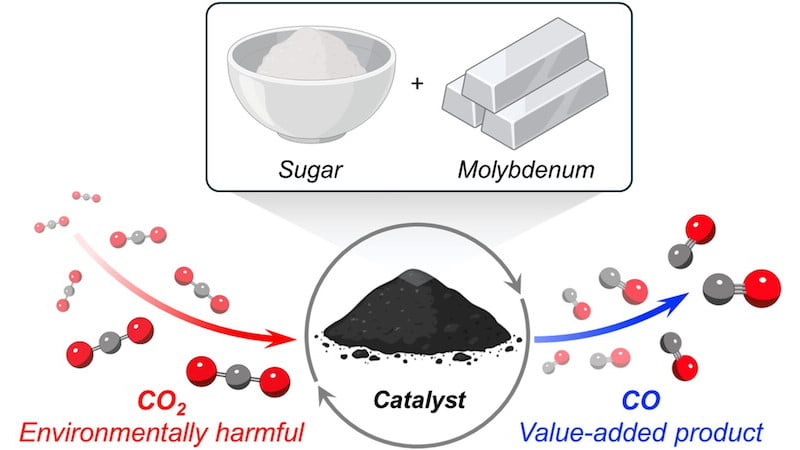
Researchers have developed a catalyst based on metal and sugar that can convert and destroy CO2. The process enables the production of chemicals and fuel.
In the fight against climate change, the focus is often on the greenhouse gases methane and carbon dioxide (CO2), whose concentrations in the atmosphere indirectly heat up our planet. But CO2 could also prove to be a valuable resource for industry in the future. This was recently demonstrated by a research team from Northwestern University.
The researchers developed a new catalyst made from molybdenum and table sugar. This can effectively convert CO2 into carbon monoxide (CO). The system has the potential to convert captured carbon into valuable products such as fuel precursors.
Catalyst made from sugar and molybdenum converts CO2
Molybdenum is a low-cost non-precious metal. The price of table sugar is also low. The combination of the two substances produces molybdenum carbide. This material is characterized by extreme hardness and ceramic properties. A key advantage of the catalyst is its ability to convert CO2 into CO with 100% selectivity.
The molybdenum carbide can therefore convert CO2 in a targeted manner without having an influence on other materials in the experimental setup. The affordability, stability, ease of production and scalability of the catalyst are essential criteria that make it attractive for practical applications. The selectivity and stability of the system could promote large-scale use in industry to specifically convert CO2 into useful products.
The method can be used worldwide
Another option is to connect with so-called Metal-Organic Frameworks (MOFs). These are able to extract CO2 directly from the air. The researchers are thinking of a tandem system in which a MOF captures the CO2 and the catalyst then converts it into something more useful.
Such an approach could provide a versatile solution. The low hurdles and the cost-effective starting materials also make it possible to use it globally, which could create huge economic added value.
Also interesting:
Source: https://www.basicthinking.de/blog/2024/05/21/treibstoff-zucker-co2/


